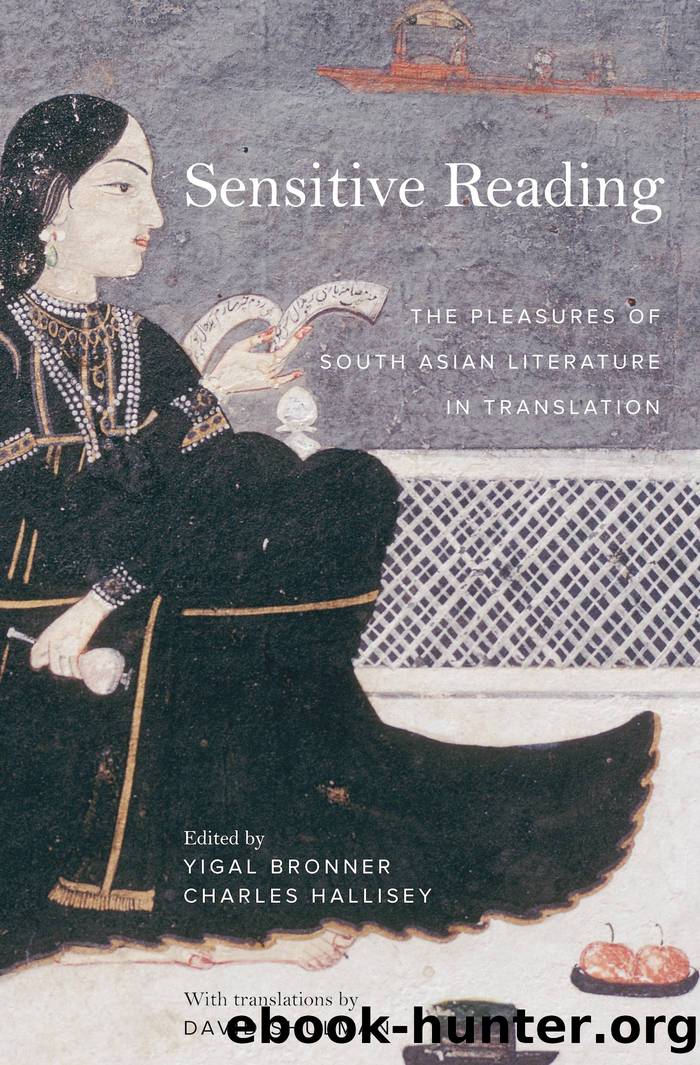Sensitive Reading by Yigal Bronner and Charles Hallisey

Author:Yigal Bronner and Charles Hallisey
Language: eng
Format: epub
ISBN: 9780520384484
Publisher: University of California Press
When I first read the heroineâs words, all too quickly, I am ashamed to say that I did not catch the flash of change: not the lightning; not the poison; not the accelerating shift in tone and stance. Rereading, slowing down, it now feels to me as if a sword has been unsheathed, as if one has talked oneself into readiness for war (âwith eyes like spears smeared with poisonâ). You will need to try enacting this in different ways, even try to modulate your breathing, and play with your sense of dramatic timing if you are to do justice to the accommodation the speaker appears to reach. Take a deep breath before continuing:
The waterfall
teeming with precious stones flashes
high on the mountain. Now tell me,
my friend, your words sweet
as sugarcane: how can he
fail to see? (734)
The gleam of the waterfall in verses 732 and 733 is a play of surfaces. The flashing light now comes from the interplay of surface and depths, from reflections of what we now see revealed under the surface. As we speak, listening to what we say, more of ourselves, or new possibilities that we might yet have be true of us, is available to be seen. Is âseeâ the right word here?
Consider again the two complementary refrains of the two set pieces: Need I say? (724â726). How can he fail to see? (732â734). What does poetry ever need to say? What does it ever bring into view that we might otherwise fail to acknowledge? This is a question facing all of us experiencing poems, and all of us experiencing poems in translation. âSeeingâ is a figure of speech for the experience of the bone-deep alchemy initiated by poetry at its best, and the expectation of acknowledgment that moves so many of us, so often, to speak. We speak at times because we wish to be seen by another, even if so often all that happens is that we speak, and listening to ourselves, we change, so coming to see ourselves anew.
Translation, the untwinning of sound and sense in one language, and the search for a new familiarity, a new relationship of sound and sense, in another, is a variety of triangulation, a variety of being in between. It is no less a site of possible change, of new possibilities for voice and self-consciousness. Possibly, it is a variety of unconsummated love. To experience it, you have only to allow yourself to form part of this triangle, allowing yourself full consciousness of the fragility of the sense of these words, and all that goes into making a voice, as they make their way from one world to another. (Iâll allow you, so to speak, to construct your own triangles, each with their own possible apexes, each potentially changing the way in which you experience reading the poem.)
You have to be willing to experiment: to try and realize these voices as potentially your own, with their meanings coming to inform your possible experiences. Again, the criteria for success here is not that of consummation.
Download
This site does not store any files on its server. We only index and link to content provided by other sites. Please contact the content providers to delete copyright contents if any and email us, we'll remove relevant links or contents immediately.
Crazy Rich Asians by Kevin Kwan(8351)
Small Great Things by Jodi Picoult(6095)
Spare by Prince Harry The Duke of Sussex(4199)
Too Much and Not the Mood by Durga Chew-Bose(3695)
Harry Potter 02 & The Chamber Of Secrets (Illustrated) by J.K. Rowling(3292)
The Ultimate Backcountry Survival Manual by Aram Von Benedikt; Editors of Outdoor Life;(2975)
Never by Ken Follett(2882)
I'll Give You the Sun by Jandy Nelson(2842)
Fantastic Beasts and Where to Find Them: Illustrated edition by J.K. Rowling & Newt Scamander(2469)
Beautiful Disaster 01 by Jamie McGuire(2438)
The One Memory of Flora Banks by Emily Barr(2349)
The Man Who Died Twice by Richard Osman(2300)
Machine Learning at Scale with H2O by Gregory Keys | David Whiting(2292)
Harry Potter and the Deathly Hallows (7) by J.K. Rowling(2215)
Holding Up the Universe by Jennifer Niven(2124)
Photographic Guide to the Birds of Indonesia by Strange Morten;(2088)
Fairy Tale by Stephen King(2071)
Will by Will Smith(2043)
Hooked: A Dark, Contemporary Romance (Never After Series) by Emily McIntire(1960)
